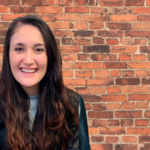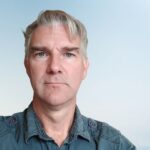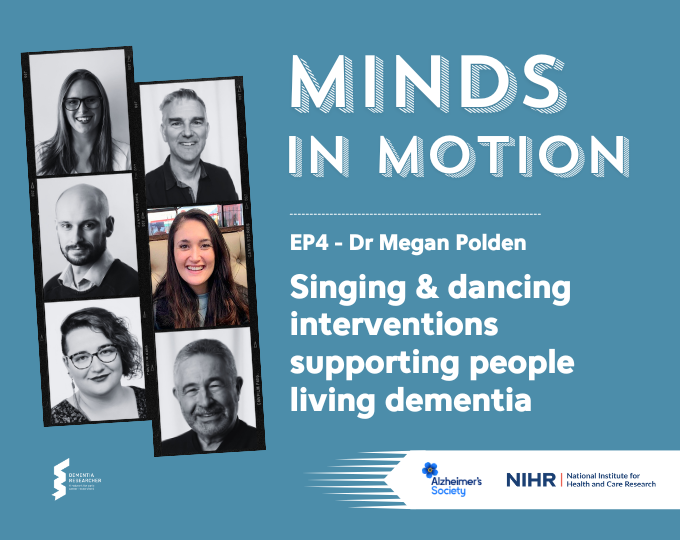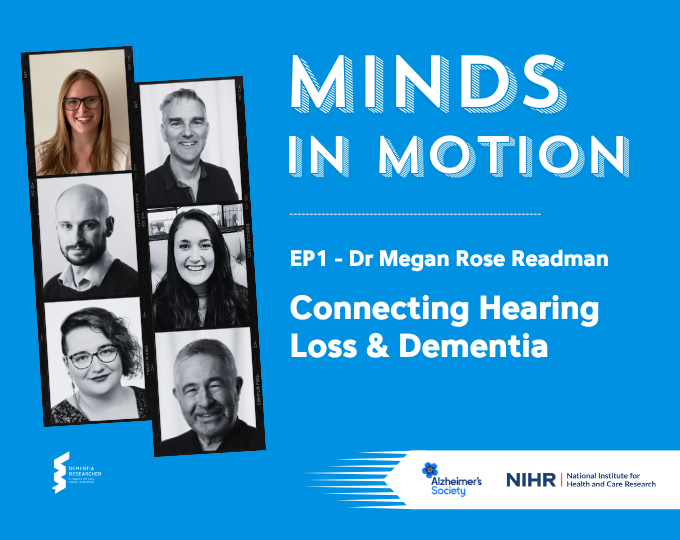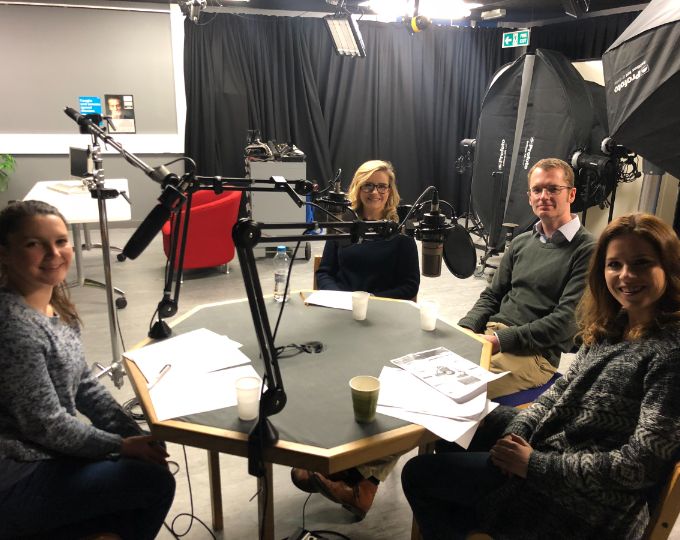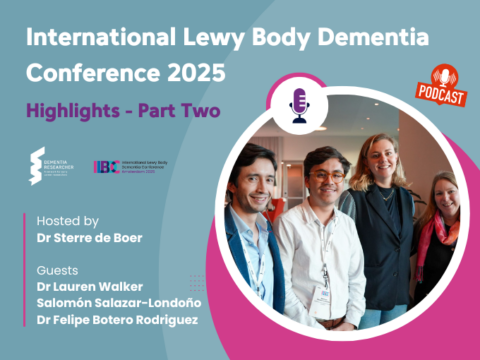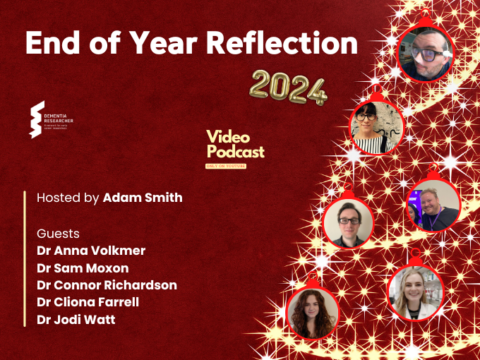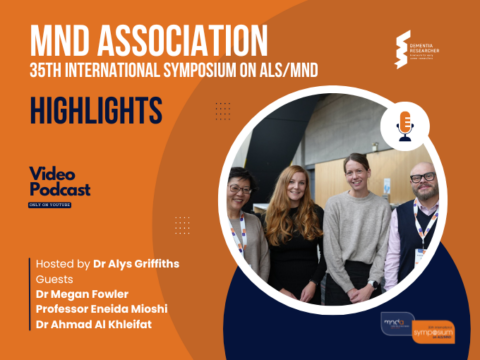The Minds in Motion Podcast from Dementia Researcher in association with the NIHR Applied Research Collaborations and Alzheimer’s Society, brings together NIHR Dem Comm Research Fellows, to talk about their research and careers.
In this first series, five of the Dem Comm Fellows each take a turn as co-host and guest. Alongside the researchers we have the incredible Trevor Salomon, Alzheimer’s Society Volunteer & Vice-Chairperson of the European Dementia Carers Working Group as our permanent co-host and anchor.
In this last show of the season Trevor is joined by Dr Megan Polden from the University of Liverpool and NIHR Applied Research Collaboration (ARC) North West Coast to interview Dr Neil Chadborn.
Neil (who you will remember from episode one) works at the University of Nottingham and NIHR ARC East Midlands. He is leading work to explore the benefits of intergenerational story telling as a way to connect people living with dementia, with a particular focus on those from minority ethnic backgrounds and the South Asian Community.
Voice Over:
The Minds in Motion Podcast from Dementia Researcher, an association with the NIHR Applied Research Collaborations and Alzheimer's Society, showcasing exciting new research and the work of the Dem Comm fellows.
Dr Megan Polden:
Hello and welcome to the fifth and final episode in this first series of the Minds in Motion podcast from Dementia Researcher. Today we have come full circle and spent time with the incredible Dr Neil Chadborn to talk about his work on sharing memories between generations and how diverse cultures understand and discuss memory problems.
I'm Dr Megan Polden and I'm a Dem Comm research fellow in the Northwest Coast, NIHR Applied Research Collaboration working at the University of Liverpool. In the last show, I had the chance to talk about my research. So today it's my turn to switch to the other side and guest hosts alongside our brilliant anchorman Trevor Salomon. Hi, Trevor.
Trevor Salomon:
Hi, Megan. Nice to see you again. Hello, I'm Trevor Salomon. I'm an Alzheimer's Society volunteer and I'm also vice chair of the European Dementia Carers Working Group. My passion and involvement is driven through the time I've spent as a full-time carer for my wife Yvonne, who was diagnosed with young onset Alzheimer's disease in 2013 at the age of 57.
I managed to look after her at home until 2019 when a combination of her doubling continence and my personal fatigue meant we needed to find a longer term professional care solution, which turned out to be an excellent care home where she's been living for the last five years. Through this podcast series, we've been hearing about some of the incredible research being delivered as part of the Dem Comm fellowship programme.
As you will all know by now, this is a terrific partnership between the NIHR Applied Research Collaborations and Alzheimer's Society, which delivers research in areas often overlooked. And I think that is the perfect segue to meeting our brilliant guests for today because his is definitely a fielded discovery that is under researched. It's my pleasure to welcome Dr Neil Chadborn, who you will of course all recognise as the host for the first show. Hi, Neil. Could I start by asking you please to introduce yourself?
Dr Neil Chadborn:
Hi, Trevor. I'm a research fellow at University of Nottingham working with the Applied Research Collaboration in the East Midlands as part of this Dem Comm programme.
Dr Megan Polden:
That's great. Thank you, Neil. And can you tell us about your current research?
Dr Neil Chadborn:
Yeah, my current research is engaging with the South Asian community, people from India, Pakistan, Bangladesh, for example, in Nottingham, Leicester and Derby, and finding out how they view memory and memory problems in their communities.
Dr Megan Polden:
Thank you. And what was it inspired you to study the sharing of memories between generation, particularly in relation to two dementia?
Dr Neil Chadborn:
Yeah. I think dementia is a challenging problem in that it includes physical, mental and social aspects. And sometimes those social aspects are missing in some of the medical literature. And our memories are really key to our sense of identity and our sense of belonging in our communities and in our homes. So that's why I'm really interested in how we share memories as part of our sense of identity.
Trevor Salomon:
I'm really fascinated by this study, Neil. Some years ago, probably 2018, I lost track of time, I went to an event run by, I think it was Alzheimer's Society, about how different cultures approach dementia and how some of them are still quite frightened and scared to even mention the word dementia and don't recognise it. So I'm intrigued to know how you see different cultures and how they manage memory problems in particular. And have you noticed any major differences in the way memory problems are addressed across those different cultures?
Dr Neil Chadborn:
Yeah, thanks Trevor. I think looking back 30 or 40 years in this country, there was a lot of stigmas about dementia. There's nothing particularly different there. In South Asian languages like Hindi, Punjabi, there's no actual translation of the word dementia. So, they do use the word dementia, but there's no word in their language which equates to dementia and rather that they use words that are quite stigmatising and negative in that sense.
So that's particularly why I talk about memory and memory problems as a way of avoiding some of that stigma and hoping that that translates a bit better and in a bit more of a positive way. So that's one way that I'm addressing some of that stigma. So, what I'm saying is that for, particularly for migrant communities who are settled in in the UK, they have faced challenges of migration and settling in this country.
And so, I think there's some reticence to approach services that there's also a tradition of family care, which is obviously a great thing in families. But that may mean that people become isolated in their own homes with an issue like dementia rather than approaching professional services. And that's an issue that I'm particularly interested in.
Trevor Salomon:
Picking up on that and just wondering, to what extent do the leaders of those communities, particularly religious leaders, play a role in helping you access people living with dementia?
Dr Neil Chadborn:
Yeah, that's a really interesting point. We're often recommended, or people mention faith leaders. I have talked to a few locally. Some of them have their own support groups, but we haven't been able to sort of attend or find out what actually happens at those groups. So, I think we're mainly staying secular for our research, and we are working with community leaders. So, for example, a very famous poet, I'm pleased to say in Nottingham is working with us, Jai Verma, so she's one of our community leaders who we're using to engage with local communities.
Dr Megan Polden:
Thanks. That's really interesting, Neil. Would you be able to talk about potentially some other challenges that you may have faced when trying to engage with some of these communities?
Dr Neil Chadborn:
That's a really good point. Going back to what I was saying earlier that the lack of awareness about dementia is an issue. People don't want to talk about it, but on the other hand that some people are happy to talk about it. So, I'm not saying that it's completely taboo, but there is some reticence in coming forward.
So yeah, we've really prioritised gauging communities, talking about memories as a way to get conversations started. For me to build up rapport with communities, obviously myself being white British, I have to work on that trust relationship and working with a colleague, Sarah Lloyd who's from Pakistan, so she has connections and can build up networks in the three cities that we're working with. That has been a good start to engage communities.
Trevor Salomon:
I'll throw in another question if I may, which is akin to that. I just wondered to what extent, Neil, you're still dealing with the notion in some of these communities that memory loss and dementia is still something that just happens to older people anyway and so they're not engaging because they don't see it as anything other than normal.
Dr Neil Chadborn:
Yeah, I think that's a key issue. And this came up in a meeting yesterday, in fact, when people were talking about how we know the difference between normal memory loss for older people and the early signs of dementia. Just going back to some of the research that's been published in this area, there's a lack of understanding in the medical world of this extent of the problem in South Asian community and other ethnicities, and part of that is a lack of data in the NHS.
So that's an issue. So, we as medical professionals are sometimes lacking data, but there's lack of knowledge in the community. So, we need to do quite a lot of that work of raising awareness. And arguably, a similar process to Dementia Friends could happen or maybe should happen, engaging more particularly with different ethnic communities.
I know for example, Alzheimer's Society have made some attempts at doing that engagement work and raising awareness, but I think it really needs to increase and scale up. Also, some other academics have worked with South Asian communities and identified some key issues to convey and messages to get across. So, I'm really building on the previous work. For example, [inaudible 00:09:53] led the ADAPT study and that led to a series of recommendations. So, I'm really basing our work on that, and we'll aim to convey some of those messages to local communities in East Midlands.
Trevor Salomon:
In addition to raising awareness as you put it, are you also having to use those good connections to remove any notion of shame or guilt about memory issues as people get older so that it doesn't become something that people can't talk about?
Dr Neil Chadborn:
Yeah, I think so. I think there are a number of layers to that really. We've already talked about the stigma. I've mentioned family care, and I think again, arguably similar to the situation in this country, maybe 40 or 50 years ago, there's an expectation of care within the family and a duty of care for the younger generation to care for older people, and that's good and can provide good support at home.
I think the difficulty is when that becomes, it develops into moderate or later stage dementia and can really strain family relationships possibly. And at that stage, if they haven't received a diagnosis, i.e., if they haven't come forward to their GP to seek help because there's a lack of understanding or a lack of awareness as we just said, then they don't have any support in place and they can't even take the first step because that hasn't happened yet.
So, there's a risk that it reaches family crisis and that can, you've strain relationships and cause distress. So, I think that's the issue is that from what little data we have, we know that diagnosis happens at a later stage in different ethnicities. And really if we can raise awareness and tackle stigma, enable people to seek that support and get a diagnosis at an earlier stage, then can be better placed to support their family member there.
Dr Megan Polden:
Neil, that's great. It's really, really interesting research. And how do you find that intergenerational communication could maybe impact the wellbeing of people with dementia by kind of promoting some of these conversations and maybe being able to lay some of the issues that you were just talking about?
Dr Neil Chadborn:
Again, there's kind of two issues here. One is that the language barrier is the obvious one. Particularly for someone with dementia, they may struggle with English because they may revert more to their native language. So, they may become more reliant on a child, daughter-in-law to go with them to medical appointments. So that's quite a tricky issue in itself where the younger generation are speaking the words for their parents and that can cause problems.
But then taking a step back from that, we've got the difference in generations. As I said earlier, the first generation have their strong traditions from India, Pakistan, et cetera, and are proud of their family tradition and their faith tradition. The younger generation, the parents have been keen for them to integrate, to attend school, the university, et cetera. And so increasingly the younger generation have been successful in their careers, but that takes them away from the family home and competes with those caring roles.
So, the daughters have expectations of being employed and having a career, whereas traditionally the daughters may have been at home caring for a parent. So that's why I think it's really important to improve communication between the generations. And in our work we're looking at sharing memories as a way of helping those conversations, to enable the younger generation to really understand what it was like to migrate to this country, what challenges and hardships they went through and what opportunities they saw in moving here and bringing up their family in this country and really seeing the benefit of that.
Trevor Salomon:
Yeah. And I'm not sure how fair a question this is Neil, but I'm going to ask it anyway. I think you referred just now to people as they get older coming from immigrant communities, they revert to what was their original mother tongue as a child. Does that make it more difficult for them to undertake the Mini Mental State Examination test, which is in English? And how relevant is that test for people who weren't born in the UK who come from another culture?
Dr Neil Chadborn:
Yeah, thanks Trevor. Really insightful question, and that's kind of where I started in this research. Many years ago, I could see that that assessment, very language orientated, but also it relates to images, to people, places, et cetera, all culturally embedded. So, as you say, we really need to understand that better. There has been a lot of work on this. See, I'm by no means the first to look into this. There've been many translations of those important assessment tools.
So, there have been translated into Punjabi, Urdu, Hindi, et cetera. So, the actual words are translated. So that's the first task. The second task is, are the professionals using those translated assessments? So, GPs, community psychiatric nurses, do they have access to translated assessment tools and are they using them in that language? Now, if you're lucky, if you have a health professional who understands your mother tongue, which will be good.
So that's an issue. The broader issue, which we've tried to explore a bit is that that whole process, that whole memory assessment may be quite a westernised idea. So is the whole setting, is it a clinical setting to people feel sort of intimidated attending that session? And so, there's cultural values in everything. So, at every step, there are issues that we need to explore more and that could be improved.
And that's the basis of my work is to work with communities to understand these things from their perspective. I've had the challenge of just having difficulty getting people to talk about these issues because of the stigma. So again, I've had to take a step back and say, "Let's talk about memory and memory problems more broadly and then we'll start talking about issues that there may be with the health service."
Trevor Salomon:
I read somewhere, and this may sound like the most nonsensical question anybody will ever ask you, that in Western society, memories tend to be formed around childhood. So, people as they get older talk about childhood memories. In sub Southeast Asian communities, many memories are much more recent. So, people talk about what's happened in later life rather than younger life. And I wondered what methods you've used to study the transmission of memories across generations in families affected by dementia. Is that a ludicrous question or not?
Dr Neil Chadborn:
It's a fascinating question and I think in fact you've read my mind as some of our ideas for future research. I don't have a direct answer. I think it is really important to be open to different ways that we understand and value and recall and share memories. I think it's all those aspects are important. And I think how we share with the next generation, yeah, I think it's complex.
And I wonder how much of our talk day-to-day relates to distant memories, to myths or faith stories, intermingle in our speech. So, it's complex. And as I say, I think it is an interesting challenge to think about people who have migrated around the world. So, their memories are far away as well as a distant time. And then communicating with the next generation who may feel a foot in Western culture and a foot in Indian culture, there are tensions there as well.
Another project that I've been involved with called Memory Machine, which is creating a digital machine to collect our memories. And we had some interesting workshops there, how do we arrange memories just as you're saying, and could a digital device help us to link up these important memories and important aspects of our identity, what it means to be us and what it means to be a family in our community?
Dr Megan Polden:
And have you identified any particular practises that are affecting in trying to bridge those memory gaps between generations? So, in terms of, you were talking about how some of these memories may have been created in different countries and around surroundings that maybe aren't there to trigger those type of childhood memories and those experiences that they may have. So, do you find using any objects or pictures and things like that can help facilitate kind of bringing those memories back?
Dr Neil Chadborn:
Yeah, I think partly going back to Trevor's question, I think some of the memories have been covered over if you like or have gone unspoken. And it may be traumatic memories of migration, also partition of India prior to migration. These can be traumatic memories, may be hidden for that reason, and go unspoken for many years in the family. So, I think then it requires careful work to explore that and clearly, we need to take care with triggering those traumatic memories. But if there is a sense of identity with those traumatic memories as well.
So that's part of our aim is to enable in particular different generations to share those memories. And we're exploring different creative approaches to doing that at the moment. So, for example, using poetry on the one hand, encouraging people to write a memoir of their parents. So, we have another community leader based in Derby who's written down her memoir of her father and his story of migration.
So, these are different ways that people have used to share memories and value memories. So that's where we're making a start. And then we're increasingly interested how we can use digital approaches to build on that or add to that or enhance that. Can we use virtual reality to sort of take people back to a place or their home village for example. These would be fascinating things to explore in future.
Trevor Salomon:
Is that where the younger generation has a role to play because technologies at their fingertips, they're very technology savvy?
Dr Neil Chadborn:
Yeah, definitely the younger generation can be involved with that and facilitate that. I have to say some of my assumptions about the digital divide, I assumed that older people wouldn't be using digital technology when I started some of this work five years ago. And meeting a group of older ladies in Leicester and they're all using WhatsApp day-to-day, which kind of surprised me.
They're communicating with family and friends back in India on WhatsApp, doing video calls on WhatsApp. So, I think we've used that within these groups to communicate with our local members and also to share comments, photos and stories and things via WhatsApp as well. So that's an example of new technologies being used by older people.
Trevor Salomon:
I visited a care home a couple of years ago pre COVID where my great aunt was living and they were trialling some technology where the resident sat on a bicycle, a very comfortable bicycle and was peddling and in front of them was a screen and they could select the city they wanted to cycle around. And many of them chose the cities where they were born.
So, they were cycling around the cities where they were born. Okay. They weren't cycling around the cities as it was when they were born, but honestly that made such a difference to how alert they were and how engaged they were and something to talk about. So, there's great stuff coming through. There's amazing technology coming through that's going to support people out there with dementia.
Dr Neil Chadborn:
I think obviously the possibilities are endless and yeah, we've just got to sort of make a start. The other thing that we're looking at is telepresence robots. And so, we had someone join in our community festival, a Mela festival in Nottingham. They joined us via robot. So, the robot was driving around the festival and they were able to drive it from home and to see what the robot could see at home and also interact with stall holders.
And they've got getting really engaged looking at the food stalls, the clothed stalls as if they're part of the festival. So yeah, some of these technologies coming forward, Neil, if we can support usability and accessibility, then they could have huge potential.
Trevor Salomon:
Keep your eyes peeled on the Longitude Prize on Dementia, if you haven't heard of it, Neil. So, there's some amazing innovations coming through there I can tell you.
Dr Megan Polden:
So interesting to hear about all the different things that are going on when integrating the technology into it. It's really great. What type of advice would you give families and caregivers who are trying to facilitate memory sharing with a loved one who has dementia?
Dr Neil Chadborn:
Yeah, that's a good question. Obviously asking those stories that may have been hidden or unspoken. And yes, spending some time to make notes if possible and start recording them. Family photos are a great source. And there's loads of archives as well, oral histories where people have told their story of migration and settling in this country. That won't be a personal memory, but it may prompt someone else's memory who has experienced a similar situation and experience.
And again, going back to my comments earlier, there's such a diverse range of experiences as the group of Gujarati population who have been living in Africa and then were expelled from Uganda, for example, and moved over in the 70s to some our cities. So, there's a whole range of different experiences, migration routes, et cetera. So, it is fascinating just to learn more about these.
Trevor Salomon:
How do you see your research evolving, Neil? I know it's very early days, but have you learned anything already that could help people from different communities no matter their heritage?
Dr Neil Chadborn:
Yeah, thanks. I'm really keen to develop this participatory research where the community is co-leading with myself. So, it's not my big idea, but it's working with them, following their interests and ideas really. And we've kind of got immediate plans, which is about supporting carers day-to-day. And then we've got some of the longer-term plans. We've suggested some of the digital ideas and some of the meaning behind some of these memories.
And as you were saying, Trevor, the sort of memories that are passed on generation to generation. So that's a lot to get my teeth into. And sometimes I get a bit distracted with too many ideas and need a bit more focus. So that's always a balance. But I'd like to encourage other researchers to sometimes take a more participatory approach where you feel a bit flexible and a bit open to ideas.
Yeah. As I say, sometimes our academic research is quite focused and narrow. Community members go, "Well, that's interesting, but how is it relevant to me or to our community or whatever?" And that's quite a tricky tension, particularly for people like me, Megan, who we're being supported to develop our careers. And quite often those academic careers can involve a very narrow focus of interest. So, there's some tensions involved in that. So, I'd encourage other researchers to just go with it and not worry too much about those tensions.
Dr Megan Polden:
Thanks, Neil. This is really brilliant work and I'm really excited to hear more as the study develops. And you've set it up really nicely starting to talk about the career and how it can be quite specific on certain parts. So, we're now going to go onto the part show where we're going to talk about some career tips and learn about your life in academia.
So, Neil, we're going to have some quick-fire questions and remember, short answers only for these ones. So, the first one is, what inspired you to pursue a career in dementia and memory research?
Dr Neil Chadborn:
Very short question. Dementia research very interestingly covers physical, mental, and social issues. And I'm interested in how that is supported in the community.
Trevor Salomon:
Short question, short answer. Thanks, Neil. Next question. What skills do you believe are essential for someone aspiring to work in dementia research?
Dr Neil Chadborn:
Definitely an empathetic approach. Trying to see things through the eyes of someone with dementia or also their care partner. That's the essential.
Dr Megan Polden:
And could you describe a typical day in your professional life?
Dr Neil Chadborn:
Well, that's interesting. A short question, did you say? I spend a lot of time hosting and organising community workshops or community events. So that's a typical day, going out to a community venue, waiting in anticipation for people to come along. Sometimes three or four people, other times 19 or 20. And trying to listen to all of those views, encourage everyone to have a voice and have express their view and their experience. Other than that, supervising students, reviewing articles, manuscripts, writing manuscripts.
Trevor Salomon:
So how do you stay current and informed within your rapidly evolving field then Neil?
Dr Neil Chadborn:
I have to say Twitter or now X has been a key part of that. I'm not sure what happen in future, but I found that very helpful. Especially over the years communicating directly with people with dementia and with their family members care partners has given me a great insight of different perspectives. And so that's from that perspective. But also from the research academic perspective, I often see the latest paper or the latest policy development on Twitter and follow it up that way. So that's a key aspect, not just Twitter, other social media is available.
Dr Megan Polden:
Yeah, it definitely helps to keep on, try and keep on top of things, isn't it? And can you recommend any resources such as books or journals that have been particularly influential in your career?
Dr Neil Chadborn:
Yeah, that's a good question. I've got, I did prepare for this, I've got a couple of books here that have been very influential. My friend's book, Living Well with Dementia, which Shibley Rahman wrote many years ago now. But that was a very influential book for me and giving perspective of someone who's been a carer. It was great. Another one is Participatory Practise by Ledwith and Springett, another former colleague of mine that's been very influential in participatory research.
Dr Megan Polden:
So, the final questions are a little different. The first one is, if you could time travel to any period in history, when would you go to share your knowledge of dementia and why?
Dr Neil Chadborn:
Well, I've recently been reading more about history of British Empire in India and about Indian independence. It's a fascinating time politically as well as aspects of the empire and imperial relationships with the subcontinent. So that would be a fascinating time to return to and listen to families caring roles and duties and how they've changed over the years and during that very tumultuous time, how people manage to keep their families together and care for family members whilst going through that and potentially migrating across the continent or across the world.
Trevor Salomon:
Now, I know when we had a brief conversation earlier, you weren't looking forward to this question, Neil, and I'm going to ask it regardless. So, if you could collaborate on your dementia research with any fictional character, who would it be and how do you think they would contribute?
Dr Neil Chadborn:
Yeah, that's a good question. What did I say earlier? I've got no idea.
Trevor Salomon:
That's what you did say earlier, yeah.
Dr Neil Chadborn:
I did, yeah. Yeah. I've got no... So, I don't know. I'm just reading Harry Potter to my son at the moment.
Trevor Salomon:
Aw.
Dr Neil Chadborn:
So that would be interesting to get Harry Potter's views on things. I've always been a bit worried about their dementor, what the significance of that was and yeah, so we'll find out as I read through the books with my son.
Dr Megan Polden:
I'm quite a big Harry Potter fan, so I very much enjoyed that answer. So I'm sad to say that that is all we have time for today, that if you want to learn more about this topic and the Dem Comm programme, visit the Dementia Researcher website where you can find a full transcript, links mentioned in the show, and much more. We will be back with a second season of the Minds in Motion podcast later in the year. But for now, I would like to thank our brilliant guest, Dr Neil Chadborn. I'm Dr Megan Polden.
Trevor Salomon:
And I'm Trevor Salomon. And you've been listening to the Dementia Research podcast.
Voice Over:
You've been listening to the Mind in Motion podcast from Dementia Researcher, in association with the NIHR Applied Research Collaborations and Alzheimer's Society. To learn more about the Dem Comm programme and to get all the support you need, visit dementiaresearcher.nihr.ac.uk. And don't forget to like and subscribe.
Like what you hear? Please review, like, and share our podcast - and don't forget to subscribe to ensure you never miss an episode.
If you would like to share your own experiences or discuss your research in a blog or on a podcast, drop us a line to dementiaresearcher@ucl.ac.uk
Did you know... you can find our podcast in your favourite podcast app on mobile devices, and our narrated blogs are also available as a podcast.
This podcast is brought to you in association with the Alzheimer's Association, Alzheimer's Research UK, Race Against Dementia and Alzheimer's Society, who we thank for their ongoing support.
The views and opinions expressed by the host and guests in this podcast represent those of the guests and do not necessarily reflect those of UCL or Dementia Researcher
A second season of Minds in Motion will be recorded in May / June and for release in the summer of 2024, so watch this space and subscribe to our newsletter for updates.

 Print This Post
Print This Post
